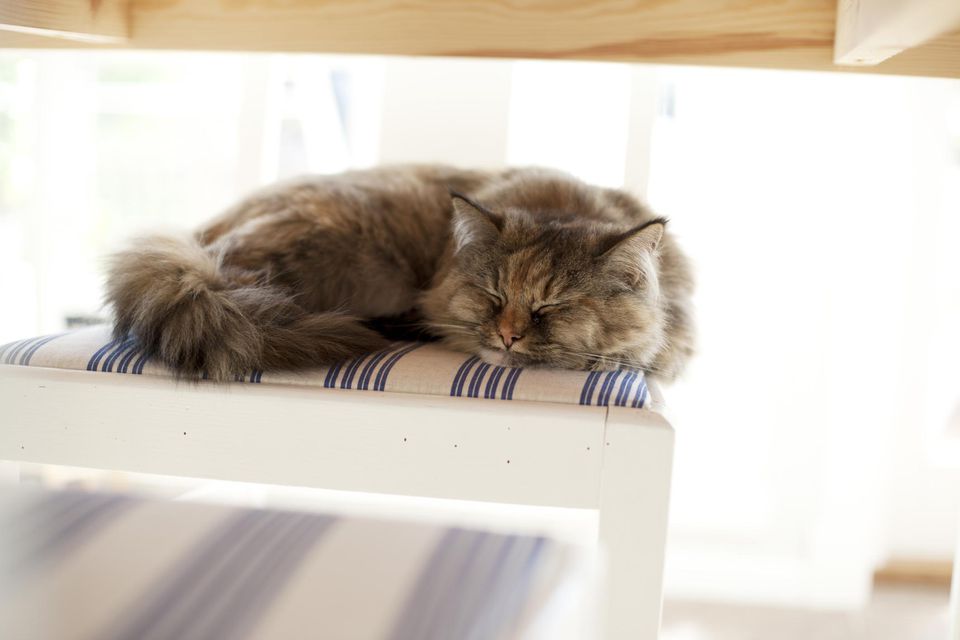
I have a 17 year old Ginger cat named Bruce. Bruce has started yowling whenever he can’t see anyone at home. It happens often during the day, but more so at night. We have noticed some poos around the house too, but he does still use the kitty litter. We want to know if he is suffering feline dementia or is it just age?
We are fortunate to have such great veterinary care and more knowledge of natural therapies to keep our gentle senior cats happy and healthy for as long as they are with us. As they reach their twilight years, you may notice changes in their behaviour, personality and health. Unfortunately, it has become common for senior cats from 11 years old and onward to develop feline dementia, or medically known as Cognitive Dysfunction Syndrome. It becomes more common as your cat ages, particularly after 15 years of age. To date there is no cure for this condition, however there are solutions you can use to make your cat more comfortable and happy as they continue to reach their gentle years. Knowing the difference between the signs of ageing and the signs of dementia will help you to provide the best quality of life for your cat.
Cognitive Dysfunction Syndrome also known as feline dementia, is simply the ageing of the brain. This is a condition that exists in all beings, including humans. As the brain ages, its cognitive processes are not as sharp, therefore our cats are more vulnerable. This can lead to a variety of symptoms such as disorientation, lack of appetite, behavioural changes and personality changes.
So how do we know when it is just signs of ageing and when it is signs of dementia? Because the brain ages as we get older, we expect that ourselves and our feline friends will move slower, sleep longer, and our overall senses are not as sharp as they used to be. However, when there a signs of dementia, your cat is more aware of their vulnerability. They become more anxious, they are scared easily and it becomes a routine of trying to calm them down. It can be tricky to diagnose, however according to most veterinarians there are several signs that can help you recognise the condition in your senior cat:
DISORIENTATION
Your cat has lived in a routine all their life. They know their way around their home, where the food, litter and your bed is. In a moment, they can forget where they are. Where is their food? Where is my person? Sometimes they can forget how to get out of their favourite hidey spots. They can sometimes panic and start meowing, calling for you to come and get them. Then they remember where they are, what the routine is and how to get out again. It can be quite difficult to watch your cat go through this, but you can certainly make it much easier for them to adapt.
Keep multiple water bowls and litter trays around your home, especially if you have stairs. Cats are less mobile as they get older; providing as much convenience for them as possible will help them feel safer and more stable to get around.
If you are going out, it would be best to close off rooms where your cat has hidey spots. In case they get stuck or disoriented in there, you want to make sure they are safe whilst you are out. Your cat may not be happy about the restriction, but at least they will be safe whilst you are out.

PERSONALITY CHANGES
Your cat might be the cuddliest, adorably affectionate cat. But if they change all of a sudden and may not be as interested in your cuddles and attention, this can be a sign of dementia. Cats usually hide when they are in pain or they don’t want to be petted, so this is usually followed by a vet visit. However, if your cat is continuously backing away from your usual affections, it can be their condition. The same for cats whom are usually aloof, they can change and become very affectionate and clingy towards you. You will know your cat’s personality better than anyone.
Depending which way your cat behaves, it can be difficult to adapt to their new behaviours. The best you can do is be patient and understanding. It isn’t personal towards you, they are unaware they have changed in some way.
HOUSE SOILING
Your cat has used the litter box or the garden outdoors for over 12 years. They know the routine and they have always been consistent (except for the occasional angry spray on the furniture). As your cat gets older they can get forgetful about where the litter box is, or even what the routine is for going to the toilet. For your cat the only priority is they need to go now – no matter where they are or whose lap they are sitting on! This can be frustrating for you to constantly clean after them, however they don’t do it intentionally. You can provide extra litter trays around the home so your cat has access wherever they need it.

ACTIVITY CHANGES
This can be expected for your senior cats. A 15 year old cat may not be as enthusiastic about chasing the fishy pole as they were when they were 5 years old. However, if they are not doing the activities they always enjoyed such as watching out the window, grooming, or exploring around your home, then this can be another sign to look out for. You can help encourage these activities by making it easier for them. If your cat enjoys watching out the window, give them different sized stoops to climb up to look outside. If they don’t mind being brushed, then you can help them groom by brushing them regularly so they don’t get matted. It is also a great time to spend together.
If your cat is still having a difficult time adapting to these changes happening to them, then it would be good to give them some calming remedies such as flower essences. It can be quite scary and your cat may be feeling under confident when they don’t feel their best. Keeping their life as consistent and predictable as possible will help them feel secure and relaxed for years to come. Understanding your cat’s needs have changed is the biggest factor to helping you both navigate your cat’s twilight years. We don’t get to keep them forever, but we do have a say in how wonderful their last years with us can become. And that makes it all worth it.
